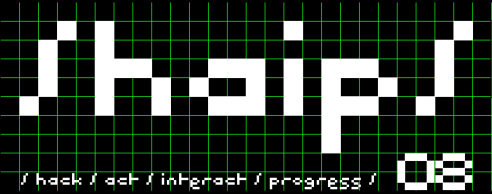Difference between revisions of "Depot:HAIP Festival"
(English proofreading 1; PROOFREAD DONE) |
(duration weeks 2012) |
||
| Line 15: | Line 15: | ||
| organised by = Cyberpipe | | organised by = Cyberpipe | ||
| frequency = biennially | | frequency = biennially | ||
| − | | dates and duration = November, late, 4 days | + | | dates and duration = November, late, 4 days |
| + | | duration weeks = 48 (2012) | ||
| contacts = {{Contact | | contacts = {{Contact | ||
| name = | | name = | ||
Revision as of 11:39, 5 December 2011

Programme
The main aim of HAIP is to establish a live and creative production platform, encouraging direct interaction with audiences and follow-up communication with participants. HAIP aims to connect local production with the international context and supports DIY – do-it-yourself – culture.
The festival lasts a few days and includes exhibitions, lectures, workshops, audio and video performances, club events, presentations, video projections, round tables, space interventions, forum, parties, etc.
HAIP interactively presents a review of free creative use of technology in the visual, sound and mass media. Through discussions it is developing a theoretical and socio-reflective context of the creative and critical use of technology. Its international workshops focus on different implications of free access to written, audio, or visual information.
Past festivals
The first HAIP took place in 2004 with 8 local and 10 foreign artists or groups participating. In 2006 the festival director was Borut Kumperščak and the festival presented project Burnstation by Rama Costentino and Platoniq, the groups Time's Up, FunkFeuer and Monochrom, Err0r, musician and producer Luka Prinčič, and many others. HAIP 08 hosted over 40 international artists in cooperation with Monochrom (Vienna), Radio FRO (Linz), Time's Up (Linz) and Ciant (Prague). The festival director was Daša Lakner.
The most recent HAIP Festival in November 2010 focused on the theme "New Nature" and the artistic and operational leader of the festival was Maja Smrekar. The festival opened with performative catering by Casa Franko in the project Molecular Kitchen. One of the festival's highlights was the workshop "Hackteria: Make your own laboratory". Hackteria is a collection of Open Source Biological Art Projects. As a community platform, Hackteria tries to encourage scientists, hackers and artists to share their expertise and co-operate. An exhibition was held in Cyberpipe and Metropol café showing projects by Verena Friedrich; Sascha Pohflepp and Alexandra Daisy Ginsberg; Saša Spačal; Herwig Wieser; and Gilberto Esparza who presented Nomadic Plants, a metaphor for the alienation of the human condition and the impact its activity has on nature. Additional events included lectures by Paul Prudence, Sascha Pohflepp, BridA, Marc R. Dusseiller, Koert van Mensvoort and performances by Evelina Domnitch and Dmitry Gelfand, and Marko Batista and Nataša Muševič.
Venues
Venues are slightly different every year but in general the festival takes place in K6/4 Institute: Cyberpipe, Club K4, Metropol Café and others (for example, Tovarna Rog).
See also
Related festivals



